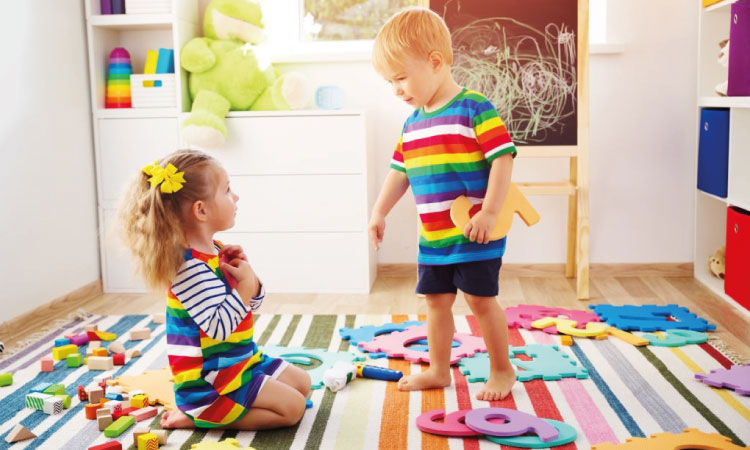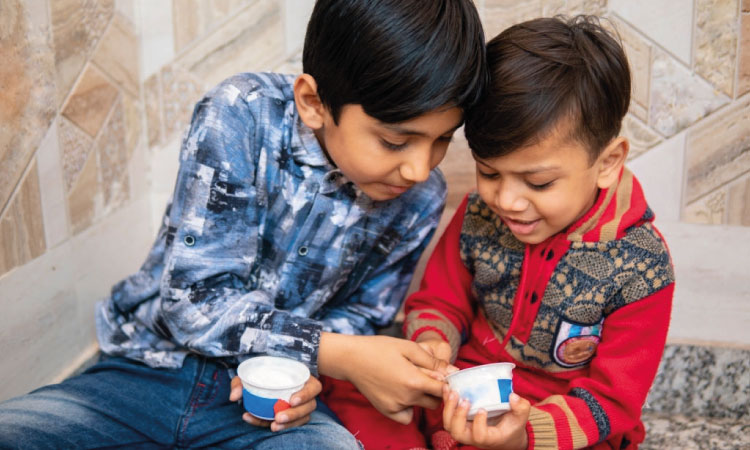A common sight in most households with toddlers is first the excitement of having a friend over, and ensuing cries and tantrums over sharing toys and other things. Conceptualizing sharing is not something that comes naturally. Sharing is a critical skill that every child develops when they play and spend time with other children. It sows the seeds for empathy and teaches the child the social skill of getting adjusted in society. To teach the importance of sharing and caring is one of the main goal for every parent. There is no specific time to teach your child the sharing and caring techniques, and there is no definite method.
For children under four, the concept of sharing and caring might be different. This means, as parents we set an example for them by which they learn from us. Teach them examples by letting them know how to wait in the queue in a supermarket or playing with toys with their siblings, if any. They must know about sharing and caring to cope with disappointments.The core remains that sharing with the other person means they care for them.
Children also need to be taught to practice sharing. In this article, we will discuss a few ways to encourage sharing in everyday life. But first, let’s first answer the basic question-
What Is The Meaning Of Sharing And Caring?
Sharing is caring is a common phrase that means when we share something with someone, it means we care for that person. Sharing is an act of kindness where you offer something that belongs to you to someone else simply because you believe that they might be in need. It could also be a situation where you share the excess stuff with others which you might think is too much for you. The importance of sharing must be taught to kids at a very early stage.
When we share something with an individual, it is equal to caring about that person and is an essential social skill for all children. By telling kids the benefits of sharing and caring, we show them that we care and the interest we have in the other person is signified by sharing. Kids at an early stage must be taught that happiness and success in life are all about caring about others, helping them in any way we can, and sharing what we have.
Though children can be sweet and angelic, when it comes to sharing things with others, most of them exhibit their refusal of sharing their possessions. Although it is natural to stay clanged to their possession, it is important to let kids know the importance of sharing and caring. Children grow up with the concepts of ‘my’ and ‘mine’. The concept of ‘us’ does not exist for them. To teach what is sharing and to make children understand its importance, parents and family play a vital role.
Related Reading: 12 Tips to Help You Prepare Your Child for Preschool
8 Tips To Inculcate Sharing And Caring In Children

Little children may have a hard time learning about the importance of sharing and caring. With sharing being an important social skill, through your perseverance, you can teach children how to be generous.
Most of the three years and the four-year-old still seek attention and want their needs to be put first instead of satisfying others. Your child may not be ready to share their things with others or let their sibling peep into their book. But, soon they will. And yes, do not forcefully pull things and hand them over to someone to let them know what is sharing.
Though the child’s sharing habits may have not been visibly exhibited, they would be probably learning about it and soon will be mature about it. Also, kids love to get praise and seek attention when they do something good. So why not follow the below techniques to teach kids the importance of sharing and caring.
1. Be a role model
Parents are role models for their little ones. If you want your little one to be generous, you have to be so and let your kid observe you. Children learn and imitate what their parents do and hence the best way to get them to follow a habit is to do it yourself.
There are plenty of ways to do this. Offering food to a homeless person or sharing the television remote with your partner. Whenever you teach them the concept of sharing, let them also share one of their belongings with their siblings or with someone else and let them know how it makes everyone happy.
Related Reading: The 10 Worst Things You Can Say To Your Child
2. Play sharing games
To let your children know the importance of sharing and caring you need to introduce them to more concepts than just doing it by yourself. One creative way to introduce the concept of sharing is to play some games and do these indoor activities for babies and toddlers’ that involve this concept subtly.
For example, you can introduce the concept of painting by which children learn to share brushes and paint colors. Another game is playing hot potatoes where the child gets to pass the ball to others during the play. Though these may not sound like a big deal, your child gets introduced to sharing through these small habits.
3. Practice taking turns
Whether it is playing their favorite games on an iPad or playing pretend to play with their favorite toys, children must be taught to take turns by letting them share their possessions with their siblings or others. This will be a fair way to introduce sharing and caring amongst kids.
You can assure your little one that everyone gets their turns by switching on a timer for 10 minutes. Introduce games like arts and crafts where a lot of tools and activities are involved with the sharing concept being a part of it.
4. Don’t label possession
The most common excuse for children not sharing things among others is because of their idea that their things belong only to themselves. It is generally a good idea to stop labeling things such as “this is mine” or “that is yours” within the household.
If your child is playing or messing with your phone, try telling casually to stop doing instead of saying “keep my phone down”. Also, while gifting toys to children, tell them that it needs to be shared with their siblings and friends instead of allowing them to take complete ownership. Also, keep a few toys and things common in the household to introduce sharing among kids.
Related Reading: Smartphones-12 Reasons To Keep Your Children Away From Them
5. Let kids work it out

Children among the same age group know how to sort things between themselves as they have a similar thought process. Hence it is better to avoid adult intervention especially when your child isn’t a toddler. However, talking to them about sharing will be beneficial though.
In case you hear a fight or an argument between your kid and the other child or with their sibling, allow them to sort things between themselves instead of jumping into the issue.
6. Accept special circumstances
Just like how we have certain things special and close to our heart which we would not like to share with others, kids have their possessions too. It could be their favorite toy or their blanket or whatever. So instead of forcing them to share their favorite possession, it is better to avoid asking them to do so. Instead, you may request them once to see if they are willing to share.
Alternatively, you may keep those special possessions privately and let the child share and play with other things and toys. However, make sure the child doesn’t hoard too many things as their special possession.
7. Lookout for teaching moments
The importance of sharing and caring can be taught to your child in any chance or any situation that you feel is right. Raising a child with good habits and skills requires a lot of patience and tolerance. To keep this process simple, look out for chances where you can tell and discuss with your child the benefits of sharing.
For example, if you go to a supermarket, ask the child to pick a few items for each member of the family apart from getting what they want. In this way, sharing lessons can be taught in all possible ways and situations.
Related Reading: The Top 10 Most Common Parenting Mistakes
8. Keep offering praises
Many parents feel that praising a child and telling them things in a polite way has worked better instead of yelling at them. So, pour some love to handle their tantrums. Instead of yelling at your child when they fail to share, start talking to them about their positive things.
Tell them about how well they shared a similar toy and ask them to do the same now. Children respond more to positive tones instead of yells. This will save their tears and frustration. Also offering frequent praises to your little one will boost their self-confidence and self-esteem.
Conclusion

One important habit to teach children is sharing. Teaching this at a young age will make them generous as they grow up. Though it is tough to inculcate the sharing habits in kids, we must not let ourselves down from stopping to teach them.
Creating opportunities and setting examples before children will help them learn better for which as parents we need to act and set examples for our kids. Wherever possible, encourage your child to put themselves in their friend’s position and ask them how they would feel if that kid doesn’t allow your child to play with their belongings.
Keep reassuring your little one that sharing isn’t the same as giving away. Make them understand that if they share their toys with friends, their friends will want to share them back.

